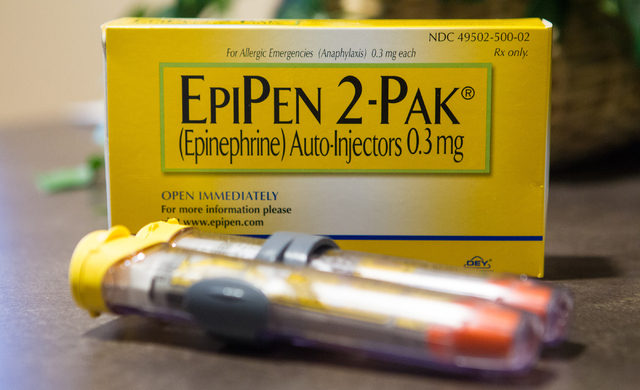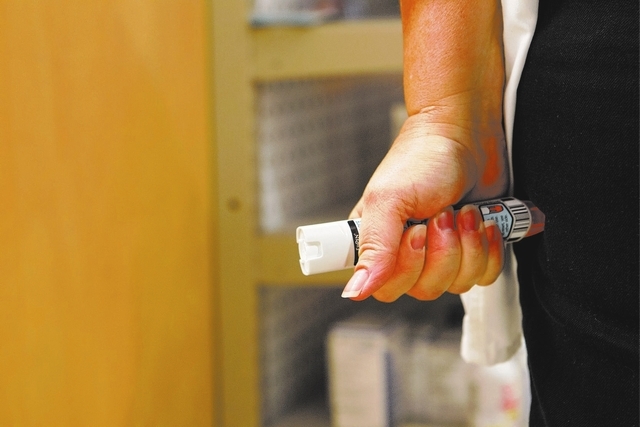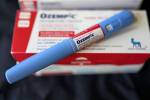Nevada public schools to stock autoinjecting epinephrine devices
It looks like the sort of oversized pencil a first-grader might use in learning how to print, albeit one that’s more colorful, a lot thicker and goofier in appearance.
Like those pencils that first-graders might use, an EpiPen is a handy thing to have around during the school day. But, unlike those pencils, an EpiPen can save a student’s life.
EpiPen is a brand name for autoinjectable epinephrine used in treating anaphylaxis, a sudden, severe, systemic and potentially fatal allergic reaction to a food, bug bite or sting, or other allergen. When symptoms of anaphylaxis appear, the jab of an EpiPen into the outer thigh delivers a premeasured dose of epinephrine into the body, which helps to alleviate symptoms until help can arrive.
EpiPens are simple to use, easy to store and pose few, if any, side effects to healthy kids. And now, thanks to a Nevada law that took effect July 1, EpiPens can be found in every public school in the state.
Just in case.
Lynn Row, the Clark County School District’s director of health services, said many students in the district who have known allergies already keep at their schools EpiPens that have been prescribed to them by their doctors. Now, under the new law, public schools also must keep on hand so-called stock EpiPens, which are prescribed to the school for use on students or adults who don’t have a history of severe allergic reactions but who may suffer an anaphylactic reaction during the school day.
Medical professionals see overwhelming potential life-saving benefit to the new mandate.
“I think it’s great,” said Dianne Cyrkiel, a certified pediatric nurse practitioner and lecturer at the University of Nevada, Las Vegas School of Nursing, given that anaphylaxis is “a life-threatening condition that can occur, and children can die.”
Dr. David Park, chairman of the primary care department at Touro University of Nevada College of Osteopathic Medicine, said anaphylaxis is a severe allergic reaction to a food, an insect bite or sting, a drug or medication, exposure to latex or another allergen.
Symptoms can occur rapidly. Among them: hives or skin rash, swelling or tingling of the mouth, tongue or ears, nausea and vomiting, blueness or pale coloring, and a drop in blood pressure, causing light-headedness or fainting. More dangerously, anaphylaxis can cause rapid swelling of the victim’s airway that can result in hoarseness, wheezing, breathing difficulty and death, sometimes within minutes.
Unlike more moderate allergic reactions, anaphylaxis is a systemic reaction that affects the entire body, Park said.
An estimated 2 percent of people will experience anaphylaxis during their lifetimes, Park said, while Row noted that an estimated 25 percent of first-time anaphylactic reactions in kids occur during the school day.
Cyrkiel said most of the allergic reactions she sees in kids are related to foods, with peanuts and shellfish representing the bulk of those.
The problem, however, is that kids may not know they are allergic to something until they suffer their first reaction. If a child should experience a severe allergic reaction at school, the EpiPen can provide help until paramedics arrive.
EpiPens contain doses of epinephrine premeasured for use in either adults or children. Epinephrine — “a lot of people call it adrenaline,” Park notes — helps to halt the allergic reaction and can help to decrease swelling and reopen the airway.
However, the epinephrine administered during an anaphylactic episode must be injected. So, the EpiPen is “an autoinjector, kind of like a small thick pen that’s very simple to use,” Park said. “Take the cap off, stick it in, and a little shot goes into the thigh, and (the epinephrine) goes into the bloodstream and helps to stop swelling.”’
And, Cyrkiel said, the needle is even long enough that if you want to give it through clothing, you can do that.
“It’s a pretty slick little device,” Cyrkiel said. “It’s not like you’re dealing with needles or a syringe. It’s very easy: You put it right up on the skin, push it and it injects.”
Park said that even if the potential signs of anaphylaxis aren’t slam-dunk obvious to a parent or teacher, there are no significant side effects associated to using an EpiPen on an otherwise healthy child.
“It’s always best to err on the side of caution,” he said. “So if a child has any type of swelling in the mouth or has difficulty swallowing or difficulty breathing, give them the EpiPen.”
(And, he said, any use of an EpiPen must be followed by medical attention.)
EpiPens are designed to be routinely carried by patients in pockets or purses or backpacks, wherever they go. And having an EpiPen available when it’s needed and then using it quickly are key to a good outcome.
With the new mandate that schools keep EpiPens on hand, they’ll be available to students who need one.
“I think it’s a wonderful idea,” Park said.
Row said the Clark County School District has been preparing for the mandate for more than a year.
“We had started a lot of training the year prior to the bill being implemented,” she said. “We kind of knew it was coming.”
As part of the district’s preparation, training programs were developed for several people in each school who, under direction of a school nurse, would be trained use EpiPens.
Also, Row said, all district staff members have received training about anaphylaxis so they can recognize the signs and symptoms of a reaction.
Already this year, stock EpiPens at district schools have been used more than a half-dozen times, Row said. In most of those cases, allergic reactions were due to previously unknown allergies. In one, she said, a student had a peanut allergy but didn’t know that what he was eating contained peanuts and didn’t have his medication with him.
“The outcome has been good for all of them,” Row added.
In mid-August, about 688 EpiPen twin packs were delivered to district schools, Row said. The pens cost about $250 per package — which means this year’s stock of devices would have cost the district more than $170,000 — but the manufacturer of the devices provided them to the district at no cost this year.
However, EpiPens must be replaced every 18 months. Row said the district may be able to obtain its first set of replacement pens for half-price, and that she hopes the district can continue to receive discounts through competitive bidding after that.
Besides requiring autoinjectable epinephrine to be placed in schools, the new legislation helped to clear up a potentially murky area of law for private school nurses, said Jody Sidranski, school nurse at the Adelson Educational Campus.
The Adelson campus has kept EpiPens on hand for several years, Sidranski said. However, it’s conceivable that using one on a student for whom one hadn’t been prescribed could have put a school nurse or the school at legal risk.
Now, Sidranski says, the school can use EpiPens prescribed to it by a physician, affording a layer of legal protection that may not have existed before.
The school has not yet had to use one of its own stock pens, Sidranski added. But even before the law was passed, had the need arisen, “I would not have thought twice about using it. I mean, they’re a lifesaving opportunity.”
Debbie Roxarzade’s daughter, Rachel, experienced her first bout of anaphylaxis when she was about 6 months old. While Rachel, now 9½, has outgrown her early allergies to egg and dairy, she remains allergic to nuts and a few other foods.
Rachel hasn’t had another anaphylactic reaction since that first one, and oral Benadryl usually takes care of the rare allergic reactions she has had since then. Yet, Debbie continues to carry an EpiPen in her purse, while the staff at The Meadows School, which Rachel attends, keeps one on hand for her, too.
Just in case.
Debbie says it does cross her mind, when it’s time to renew the EpiPen prescription or when she sees the pen unused in her purse, that maybe it’s no longer necessary.
“Part of it is, ‘Oh, forget it. I don’t think I need it,’ ” Debbie says. “But the other part is, ‘What if this is the time something happened and you don’t have it?’ ”
So, Debbie renews the prescription annually. And, she figures, that’s pretty great.
“Every year you don’t use it and it expires is like the best thing,” she says. “The best thing I could think of is to not have to use it.”
Contact reporter John Przybys at jprzybys@reviewjournal.com or 702-383-0280.






























